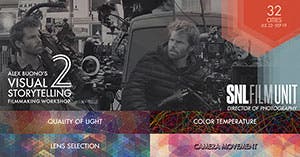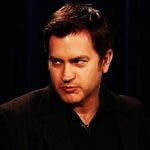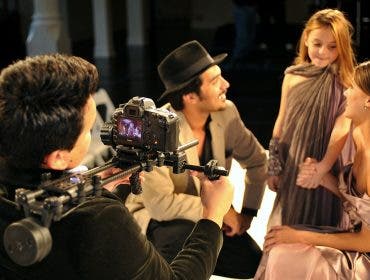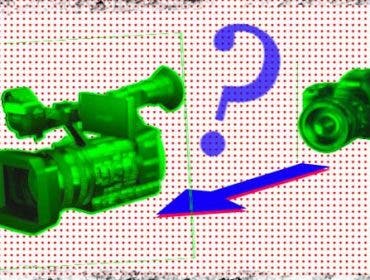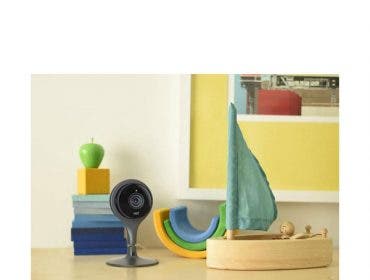
Alex Buono grew up in Portland, Oregon. He then attended the USC School of Cinematic Arts and, after graduation, worked his way up through the film production industry. Early on, he worked on films like “Twister,” “Armageddon,” and “The Conspiracy Theory” among others. Having gravitated towards the cinematographers, camera operators and assistants to the guys who frame the movies, Alex went from cleaning the mud off of equipment to loading film and then finally ended up as the DP for the Film Unit at Saturday Night Live. He’s had a pretty rich career, often taking breaks from SNL to shoot films like “Green Street Hooligans,” commercials, even producing and shooting the documentary “Bigger Stronger Faster.” His short film “Johnny Flynton” was nominated for an Oscar and currently he is co-directing the IFC mockumentary series “Documentary Now!”
It goes without saying that Alex has a lot of accumulated knowledge to impart on budding filmmakers. And thankfully he has been touring North America doing just that: teaching film production techniques through a workshop titled Visual Storytelling. Having teamed up with MZed, a company specializing in organizing and promoting live educational tours, Alex talks (and literally walks) you through various tricks and tips when it comes to lighting and shooting film.
Personally, I found the workshop to be fascinating. Being a content creator myself (a shooter and editor of video), the overall lesson was revelatory to the point of being invaluable. Not to mention surprisingly practical. In his approach, Alex is seemingly aware of the limited budgets and resources his students are forced to work with. Thus, we are shown how to strip down our gear while simulating a higher budgeted “look.” That’s not to say that the workshop itself was “cheap” as Alex utilized elaborate backdrops, props, various monitors, video clips and equipment to help illustrate the filmmaking principles he conveyed.
So it was with great pleasure that I sat down with Alex Buono to discuss his background, the projects he’s worked on and how Visual Storytelling came to be.
ME: Let’s start off with discussing your background. You were raised in Portland, Oregon–
ALEX: That’s right. I went to film school in LA — USC — right out of high school. First job out of film school I was a camera assistant on “Twister.” I was a camera assistant for a few years and started shooting things while I was in between jobs and during the weekends and kept shooting things until I sort of could pay my bills shooting. And then I retired from camera assisting and shortly after that I got this crazy job shooting for the film unit at SNL. I mean, I was 24 years old and although I really didn’t know enough about cinematography to be shooting for SNL. But, you know, it was a lucky break. I had been shooting a low budget feature in North Carolina and the producer happened to also produce the SNL film unit and we got along really well and she said why don’t you come along and try this out? At the time they were less focused on making great looking spots, “this is a funny spot, it doesn’t really matter how slick it looks.” Yeah, so I could sneak by not really knowing what I was doing for awhile. Just working hard and helping them deliver funny spots. Over the course of fifteen seasons, the focus has become more and more about getting close to the reference material “look.” The director Reese Thomas is a very smart guy. He could shoot these things himself if he wants to. He knows everything about cameras and lenses. He wants this very careful aesthetic. So we’re spending a lot more time getting this look as close as we can to the reference material
ME: That takes a lot of preparation. The way Saturday Night Live tends to work, you just have a week to get your host, to develop the skits around that… from that point to “okay we have to set up the shoot, get it to look right, possibly with that host of the week.” How do you guys pull that together so quickly?
ALEX: It’s kind of a magic trick because we’ve been working together for so long. I’ve worked with Reese for ten years or our editor Adam (Epstein) for eight years… our writers have been figuring out this magic for forty years. And the pace of it, it’s a difficult pace to do and every week it feels like it’s impossible. You basically write… the writers write Monday and Tuesday… and we get delivered the scripts on Wednesday night/Thursday morning and you prep Thursday and shoot Friday. It’s just this pattern you go through. Everybody knows the deal, we know what we can do and cannot do. We have learned how to avoid certain train wrecks. So we just don’t put ourselves in a position where we know we’re not going to finish that shoot. And it’s never really finished. It’s just that’s where we are at 11:30 on a Saturday night.
ME: That’s just amazing. So you have less time than I initially thought. You just have a few days as opposed to a full week–
ALEX: We have about 48 hours. You have half a day for post and it has to be done by 8pm for dress rehearsal.
ME: I want to go back a bit. Why film school?
ALEX: I was simply a film fan. I didn’t know what a “DP” was I just wanted to be in the Film Business. I was enamored with film as a kid and, you know, you’re sixteen-seventeen years old and trying to think about what college to go to and I just wanted to go to film school so it wasn’t about being a director or being a producer or a cinematographer. But in film school I found myself gravitating to photography and cinematography and then I graduated and I became the guy who was shooting everyone’s short films as opposed to being the guy who directed them. And it just took a few years to realize that while I love cinematography it’s not quite enough of the experience for me so I also want to be producing the movies I’m shooting and I want to be a part of the post process. So I had gravitated toward this relationship that was a little more than just the camera work part of it.
ME: Not to date you, but when you went to school… that was probably pre digital?
ALEX: Oh yeah, I went to school in the early 90s. We shot our short films on Super 8 cameras and MiniDV was the new thing. We cut on flatbeds and Moviolas and we had one non-linear editing system. By the time I graduated I think there was one Avid that people had been hearing about but that was the early days.
ME: Did you embrace digital technology at first?
ALEX: We certainly tried everything at SNL basically because the work is so… I mean we were shooting in film stock. So we’d shoot on film on Friday and you’re processing on Friday night and you’re still delivering on Saturday so digital cameras were this incredible advance for us to not have to shoot on film stock because we don’t have time to develop it, you know? So we knew a digital camera would help us but the early versions, they hurt the look as much as they helped the workflow. They just didn’t look very good. You’re going from 35mm film stock to MiniDV over night and everyone’s like “yeah, the workflow is great” but this looks horrible! So we just kept trying everything. The cameras got better as you went from MiniDV to HDcam and now we’re going from a two-third inch chip to a full frame chip. And then the DSLR thing in 2009 was a big difference because suddenly we felt like it was getting a lot better looking. We had shallow depth again. It just kept getting better and better to where now I wouldn’t want to go back to film stock on this schedule. That would be crazy! Someone said “you have your option. You want to shoot with 35mm?” And I said “absolutely not, not with this turnaround schedule!”
ME: Are you shooting on 4K now?
ALEX: It depends. I’m pretty camera agnostic. The camera just has to be right look for the thing I’m shooting. Some things you shoot with the Dragon, some things with an Alexa, some with a Canon. We need a lot of different frame rates and resolution. If we’re shooting with 16mm lenses or we’re shooting super slow motion a Red might be the right camera. If we want a really cinematic look we’d be alright with an Alexa. We need really great low light sensitivity Canon might be the right choice. We just try to make sure we’re using the right tools.
ME: You spend most of your time between New York and the West Coast. How is that working out for you?
ALEX: I’m used to it now. It’s not as bad as everyone thinks. “My god you’re, like, travelling every week!” And I’m, like, “but it’s the exact same flight it’s the exact same people on the flight, it’s the exact same flight staff usually.” There’s this rhythm to it that I’ve just gotten used to. I sleep on the plane, I get up and it’s time to go to work. It’s a five to six hour flight so I can actually get a decent amount of sleep.
ME: One of my favorite parts of the workshop is when you got into different documentary styles. It’s interesting how you can go from verite to a stylized, “Thin Blue Line” kind of thing. You produced and shot “Bigger Stronger Faster.” Do you want to do more documentaries like that?
ALEX: I’m making a documentary right now, “The Deporter.” But documentaries take forever. They take forever to marinate and resolve themselves and the constant shooting… I’ve been making that for a year. “Documentary Now!” is a series I am shooting with a documentary aesthetic–
ME: Do you think you’ll do an episode that might make fun of “Bigger Stronger Faster?”
ALEX: (laughs) We might do something like that kinda-sorta personal POV take. Probably nodding more towards Morgan Spurlock or Michael Moore. That kind of film.
ME: Visual Storytelling. This is the second year. How did it come about? Did you decide “I’d like to go on tour teaching film?”
ALEX: I was approached by this company. They hadn’t done a video tour before. I had done a little bit of speaking for Canon at trade shows and then I was approached by Jeff Medford who is the owner of MZed, the company that produces these tours. And we started talking about what would that be and when I was coming up as an assistant working with all these great cinematographers and they were always these really great mentors who taught me a lot. And I’m not comparing myself to those guys — they were amazing — but if I can help somebody else and give them advice I would definitely do it. It’s over the summer and I told them they can have me for two months and how many cities can we take in within two months and this year it was thirty three–
ME: It seems like a vast undertaking because you’ve got all sorts of equipment you travel with.
ALEX: Yeah that’s all Jeremy (Jeremy Silveira, Tour Manager) and he’s got three guys with him… they do it all.
ME: It doesn’t come with you on the Redeye?
ALEX: (laughs) No-no. They got an RV and a trailer they’ve been driving around the country all summer.
ME: It’s kind of like a rock tour.
ALEX: A little bit. I don’t drive it. I mean, I take the RV once in awhile but they’re driving 16 hours, twelve hours…
ME: Are you going to do a third one?
ALEX: I don’t know. It’s really hard, it’s really time consuming. It’s not just the two months of the tour but it takes months to develop material, line up the sponsors, you know. Actually, this time when I agreed to do this I didn’t know if there was going to be a conflict when it came to completing my new series. But it’s a lot of work.
ME: Maybe you’ll be ready to do Visual Storytelling Three after you’ve recharged your batteries?
ALEX: Yeah. Maybe. You never know.
ME: I only have one more question. Any cinematographer you haven’t worked with living or dead you would’ve loved to have had the opportunity to work with or pick his or her brain?
ALEX: Gordon Willis. He was pretty amazing. He came to our school one time and he was phenomenal. He would have been amazing to watch on set.
Although Visual Storytelling 2 has ended its 2015 tour, you can download recordings of the full workshop at the MZed website. Alex’s new series “Documentary Now!” starring Fred Armisen and Bill Hader is currently airing on IFC.
